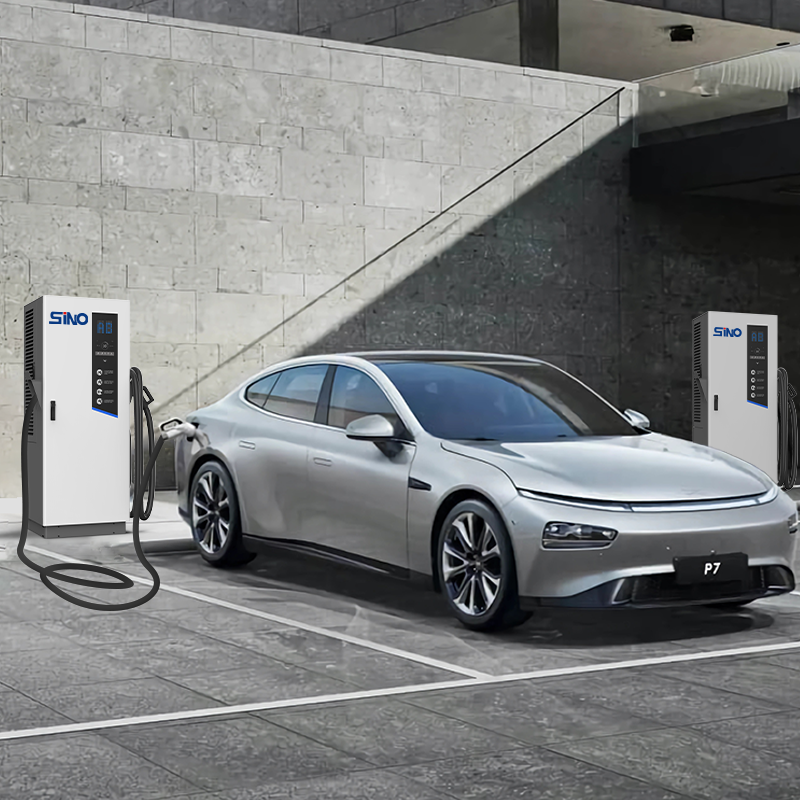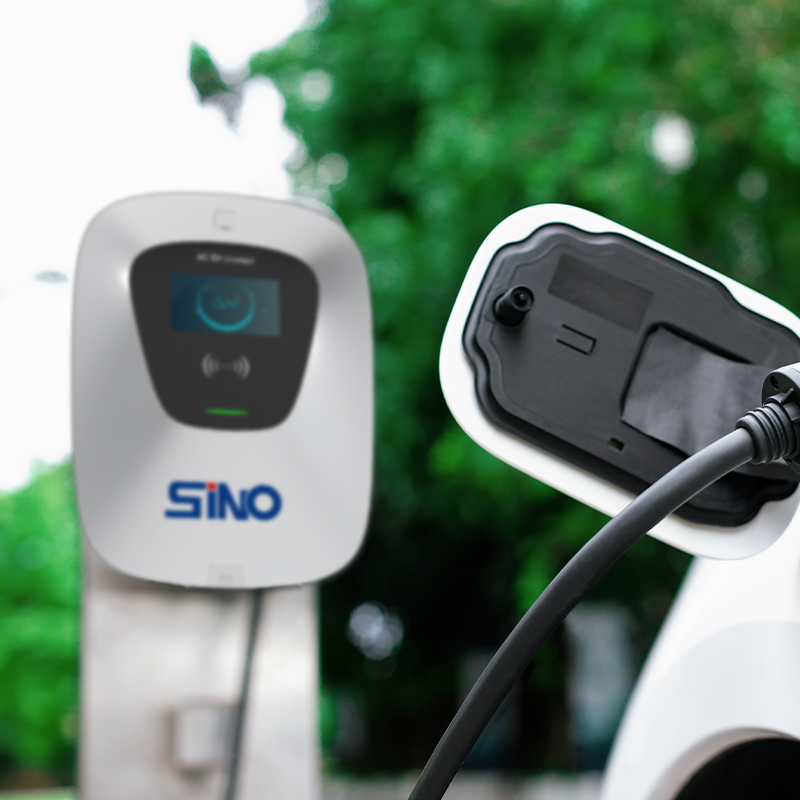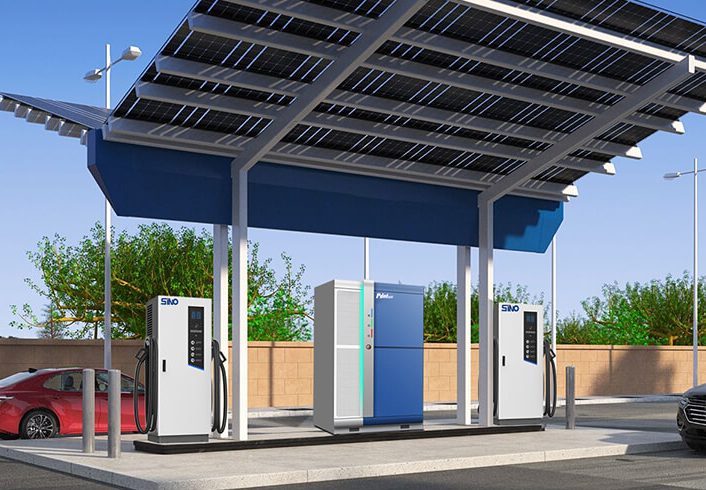How Much Does a Commercial EV Charging Station Cost?
As more and more people use electric vehicles, the demand for commercial EV charger stations is growing. Depending on the type of charger and infrastructure needs, the cost of installing these devices varies greatly.
This article will analyze the cost of commercial EV charging stations to help businesses make the right decision when investing in EV charging technology.
What Is a Commercial EV Charging Station?
Commercial EV charging stations are public or semi-public facilities equipped with EV chargers ranging from Level 1 chargers for slow-speed charging using standard 120-volt sockets, to Level 2 chargers for medium-speed charging using 240-volt sockets, and DC fast charging stations (Level 3) for fast charging using high-voltage DC power.
Commercial electric vehicle charging stations are typically installed in high-traffic areas such as shopping centers, public places, and workplaces to support a variety of charging needs and facilitate long-distance travel. They are also designed to function in different environmental conditions.
Factors Influencing the Cost of Installation
The cost of installing commercial EV charging stations can be influenced by a variety of factors:
- Type of Charger: The level of charger (Level 1, Level 2, or DC Fast Charging) significantly affects cost, with Level 1 being the least expensive and DC Fast Chargers being the most costly due to higher power and infrastructure requirements.
- Electrical Infrastructure: Existing electrical capacity at the installation site can affect costs. Sites requiring significant upgrades to electrical panels or new power lines will see higher costs.
- Physical Installation Needs: The complexity of the installation, including the need for trenching to lay conduit, constructing bases for chargers, and compliance with ADA requirements, can add to the cost.
- Permits and Regulations: Costs can vary based on local regulations, permitting, and the need to comply with zoning laws, which might require additional work or fees.
- Network Connectivity: Chargers that are part of a networked system may require additional investment in software and hardware to handle communications and billing, which can increase initial costs.
- Labor Costs: The cost of labor can vary significantly by location and can impact the overall cost of installation. Sites that are more challenging to work on may require specialized labor at a higher cost.
- Site Preparation: Costs can increase if the site requires significant preparation, such as landscaping, paving, or lighting, especially in complex commercial environments like shopping malls or office parks.

Level 1 Charging Station Cost
The costs associated with installing a Level 1 charging station will vary depending on several factors, including location, local electricity and labor rates, and user-specific requirements. Below is an estimate of the cost of each:
- Purchase Cost: Level 1 charging stations are relatively inexpensive compared to Level 2 and 3 charging stations. Costs range from as low as $300 to approximately $1,500, depending on the brand and additional features available.
- Installation Costs: Level 1 charging stations plug directly into an existing 120-volt outlet, so there may be no additional installation costs here. If electrical upgrades or new specialized outlets are required, the cost of upgrades and replacements can range from $100 to $1,000, depending on the complexity of the electrical work required.
- Operating Costs: Operating costs are primarily related to electricity consumption, due to local electricity prices and the frequency of charger use. maintenance costs for Level 1 chargers are generally low, but on average, inspections and minor repairs can cost $50 to $100 per year.
- Ease of use: This is not a direct cost, but longer charging times can be a major inconvenience, which may cause some users to upgrade to faster chargers later. Indirect costs here include potential lost opportunities or dissatisfaction.
- Upgrade Costs: If there is a need to upgrade to a higher level charger in the future, there may be a need to purchase a new charger (Level 2 chargers range in price from $500 to $6,000) and additional installation costs as outlined for Level 2 installations.
Level 2 Charging Station Cost
The cost of installing a Level 2 charging station can be seen in the following areas:
- Purchase Cost: The cost of the Level 2 charging station itself typically ranges from $500 to $6,000, depending on the manufacturer, features, and charging capacity.
- Installation Cost: The cost of installing a Level 2 charging station varies widely, typically ranging from $500 to $3,000 or more. The total cost is determined by the complexity of the installation, such as the need to upgrade existing electrical infrastructure or the distance from the power source to the charging station.
- Operating Costs: Operating costs, including electricity and regular maintenance, can vary. Electricity costs are due to local energy prices and how often the charger is used. Annual maintenance costs can range from $100 to $500 and are generally determined by service plans and local labor rates.
- Equipment Durability: The potential cost of replacing parts or the entire unit due to wear and tear or damage caused by environmental factors is more difficult to quantify upfront. However, it is prudent to budget a few hundred dollars per year to cover potential unexpected expenses.
- Future Adaptability: Costs associated with upgrading or replacing charging stations to keep up with technological advances or increased demand can be significant. These costs are determined by future market developments and are difficult to estimate accurately without specific details about technological advances and individual usage patterns.
Level 3 Charging Station Installation Cost
Also known as a DC fast charger, the installation of a Level 3 charging station is a complex project involving high initial investment and operating costs, while also providing fast charging for users. Its installation cost can be reflected in several ways:
- Purchase cost: The cost of Level 3 EV charging equipment itself ranges from $10,000 to over $50,000 per unit. Prices vary depending on charging capacity, brand, and additional features such as smart charging capabilities or integrated energy storage.
- Installation Costs: Installation costs can be high, typically ranging from $20,000 to $100,000 or more. This includes electrical upgrades, construction work required to prepare the site, and labor costs. Costs may increase if existing electrical infrastructure needs to be upgraded or if the installation site is located in a remote area. 3.
- Operating costs: Electricity costs will be higher due to the high power consumption of Level 3 chargers. Maintenance costs also vary, ranging from $1,000 to $3,000 per year, depending on frequency of use and local labor rates.
- Site compatibility: The cost of site preparation varies widely. Simple installations on already compatible sites are less expensive, while groundwork on more challenging sites can add tens of thousands of dollars to a project.
- Permits and regulations: The cost of obtaining permits can range from a few hundred to several thousand dollars. Compliance with local building codes and environmental ordinances can also incur additional costs.
- Future upgrades: Setting aside funds for future technology upgrades or expansions is also a safeguard. The exact amount depends on technological advances and market trends.
Additional Costs and Considerations
When considering the installation of a commercial EV charging station, there are additional costs and considerations beyond the initial setup that businesses need to account for:
- Maintenance and Repair Costs: Regular maintenance is required to ensure the charging stations operate effectively and safely. This includes routine inspections, software updates, and repairs of physical or technical issues.
- Utility Rates and Energy Consumption: The cost of electricity can vary significantly by location and time of use. High energy consumption during peak times can lead to demand charges, which may substantially increase operating costs.
- Payment Processing and Network Fees: For networked charging stations, there may be additional costs related to payment processing and network services, which handle the management and billing of the energy consumed by customers.
- Insurance: Depending on the location and nature of the installation, additional insurance may be required to cover potential liabilities associated with operating high-power electrical equipment in public or semi-public areas.
- Technology Upgrades: Technology in the EV sector evolves rapidly. Upgrading hardware and software to keep up with the latest standards and customer expectations can be a significant ongoing cost.
- Accessibility and Compliance: Ensuring that charging stations are accessible to all users, including compliance with the Americans with Disabilities Act (ADA) in the U.S., may necessitate additional investment in infrastructure and design modifications.
- Marketing and Signage: Attracting EV drivers to charging stations can require signage and marketing efforts, which are additional costs that need to be considered for successful operation.
Finding the Right Electric Vehicle Charging Company
Choosing the right electric vehicle charging company requires researching and comparing all of these aspects to find a provider that fits your financial budget and also meets your operational and sustainability goals. Piwin Corporation, a manufacturer of car charging stations with the highest technology and safety features, is a great choice.
Piwin is a leading provider of electric vehicle (EV) charging solutions. Offering a wide range of products, from portable chargers to high-performance AC wall boxes and ruggedized DC fast charging stations, Piwin specializes in innovation, sustainability, and the provision of reliable, efficient charging infrastructure. Their products meet the needs of both individual and commercial customers, ensuring the accessibility of advanced electric vehicle charging technology.

Conclusion
This article provides an overview of commercial electric vehicle charging stations, describing the types of Level 1, Level 2, and DC fast chargers and their cost, installation, and operating expenses. There are also financial incentives that can reduce installation costs and the importance of choosing an experienced charging company with a wide range of products and reliable customer support to provide reliable charging.
Related Reading: The Benefits of EV Charging Stations for Businesses



